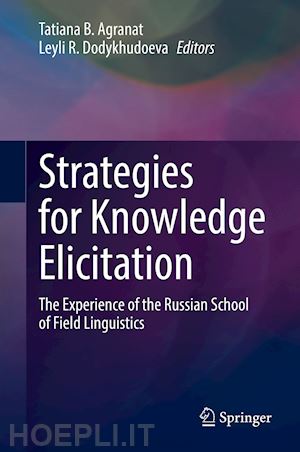

Questo prodotto usufruisce delle SPEDIZIONI GRATIS
selezionando l'opzione Corriere Veloce in fase di ordine.
Pagabile anche con Carta della cultura giovani e del merito, 18App Bonus Cultura e Carta del Docente
This volume provides an overview of experimental methods, approaches, and techniques used by field linguists of the Russian school, and highlights the fieldwork experience of Russian scholars working in regions with a range of languages that differ genetically, typologically, and in the degree of their preservation.
The collection presents language and sociolinguistic data relating to fieldwork in diverse languages: Uralic, Altaic, Paleo-Siberian, Yeniseian, Indo-European Iranian, Vietic, Kra-Day, and Mayan languages, as well as pidgin.
The authors highlight the fieldwork techniques they use, and the principles underlying them.
This publication is intended for academics, and for specialists in the field of linguistics and minority and indigenous languages. It will also benefit students as a guide to field research, as well as language activists, interested in documenting and preserving their mother tongue.
Chapter 1. Intermediary Language in Field Experiments (Tatyana B. Agranat).- Chapter 2. Methodology for Collection of Data and Elicitation of Knowledge on Eastern Iranian Languages (Leyli R. Dodykhudoeva and Vladimir B. Ivanov).- Chapter 3. Documenting the Lexicon of World-View and Systems of Belief (Joy I. Edelman).- Chapter 4. Communication on the Russian-Chinese Border: Problems of Obtaining Data (Kapitolina Fedorova).- Chapter 5. Object Emerging in the Hands of the Researcher. Notes From A Summer Expedition To Kellog, A Ket Village In Siberia (Julia Galyamina).- Chapter 6. Fieldwork In The Situation Of Language Shift (Olga Kazakevich).- Chapter 7. Collecting Data For The Documentation Of The South Eastern Huastec, A Mayan Language In Mexico (Ana Kondic).- Chapter 8. A Sociolinguistic Survey Of An Internal Diaspora: A Field Research Of A Chuvash Diaspora Group In The Moscow Region (Marina Kutsaeva).- Chapter 9. ‘The East Is A Delicate Matter’ (Influence Of Ethno-Psychological Factors On The Outcomes Of Fieldwork) (Boghsho Lashkarbekov).- Chapter 10. What Field Research Is Needed To Study The Linguistic Need Of A Minority Language? (Svetlana Moskvicheva and Alain Viaut).- Chapter 11. Linguistic Fieldwork Among The Chukchi (Maria Pupynina).- Chapter 12. Aspects Of Data Collection Arising From A Field Survey Of The Isolating Languages Of Vietnam (Irina V. Samarina).- Chapter 13. Dialogue-Focused Experiments In The Field: Advantages And Disadvantages (A Permic Experience) (Maria Usacheva).











Il sito utilizza cookie ed altri strumenti di tracciamento che raccolgono informazioni dal dispositivo dell’utente. Oltre ai cookie tecnici ed analitici aggregati, strettamente necessari per il funzionamento di questo sito web, previo consenso dell’utente possono essere installati cookie di profilazione e marketing e cookie dei social media. Cliccando su “Accetto tutti i cookie” saranno attivate tutte le categorie di cookie. Per accettare solo deterninate categorie di cookie, cliccare invece su “Impostazioni cookie”. Chiudendo il banner o continuando a navigare saranno installati solo cookie tecnici. Per maggiori dettagli, consultare la Cookie Policy.